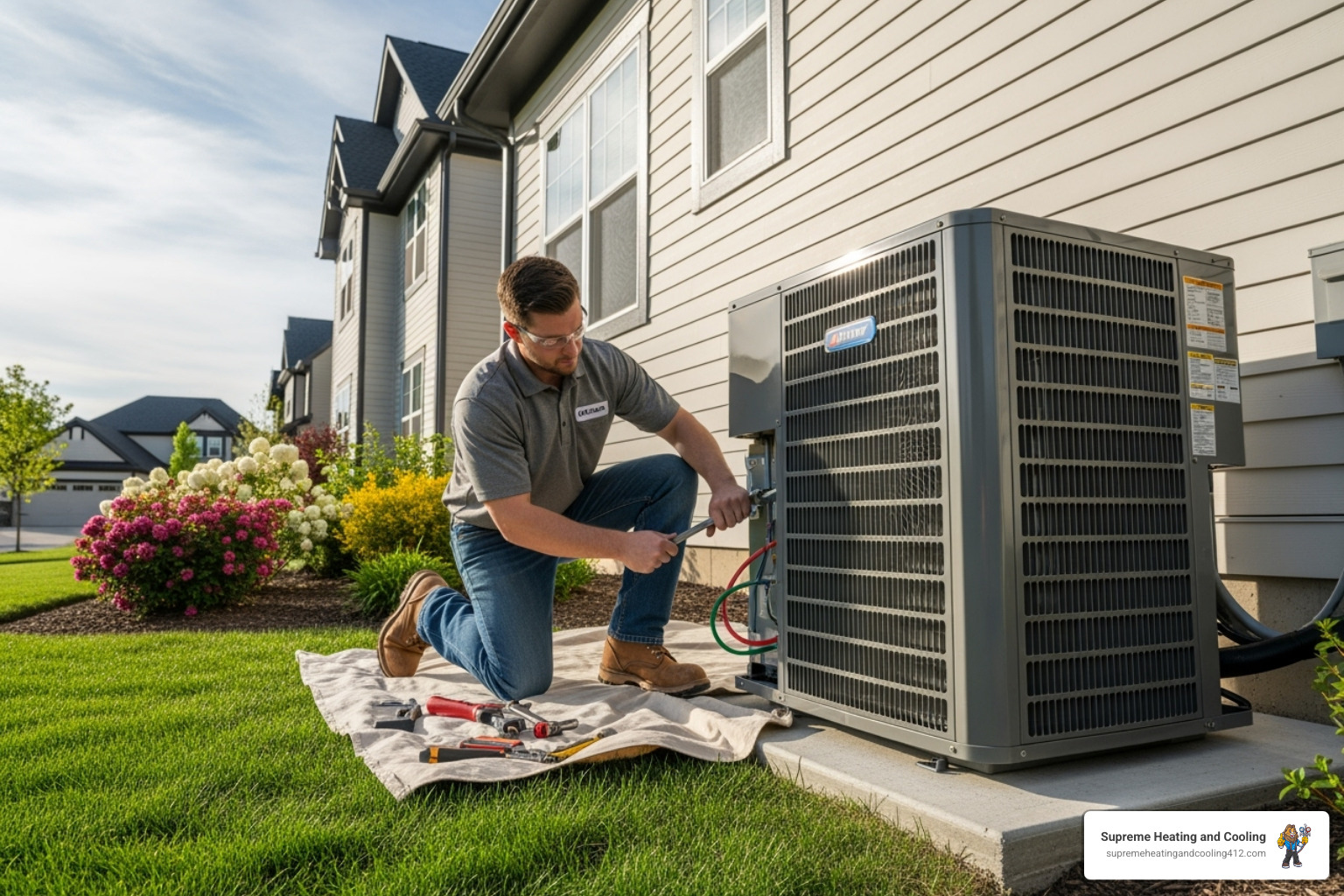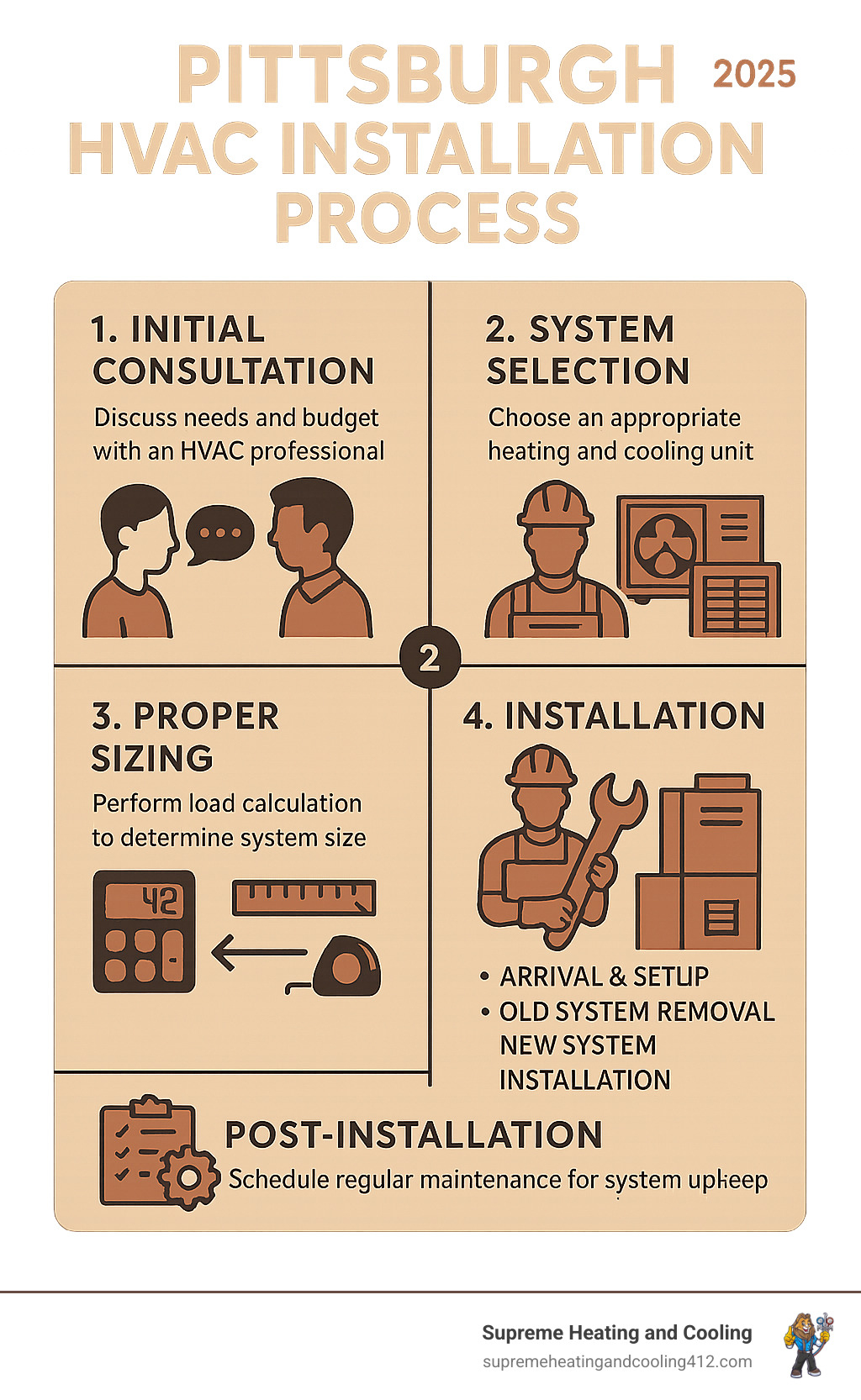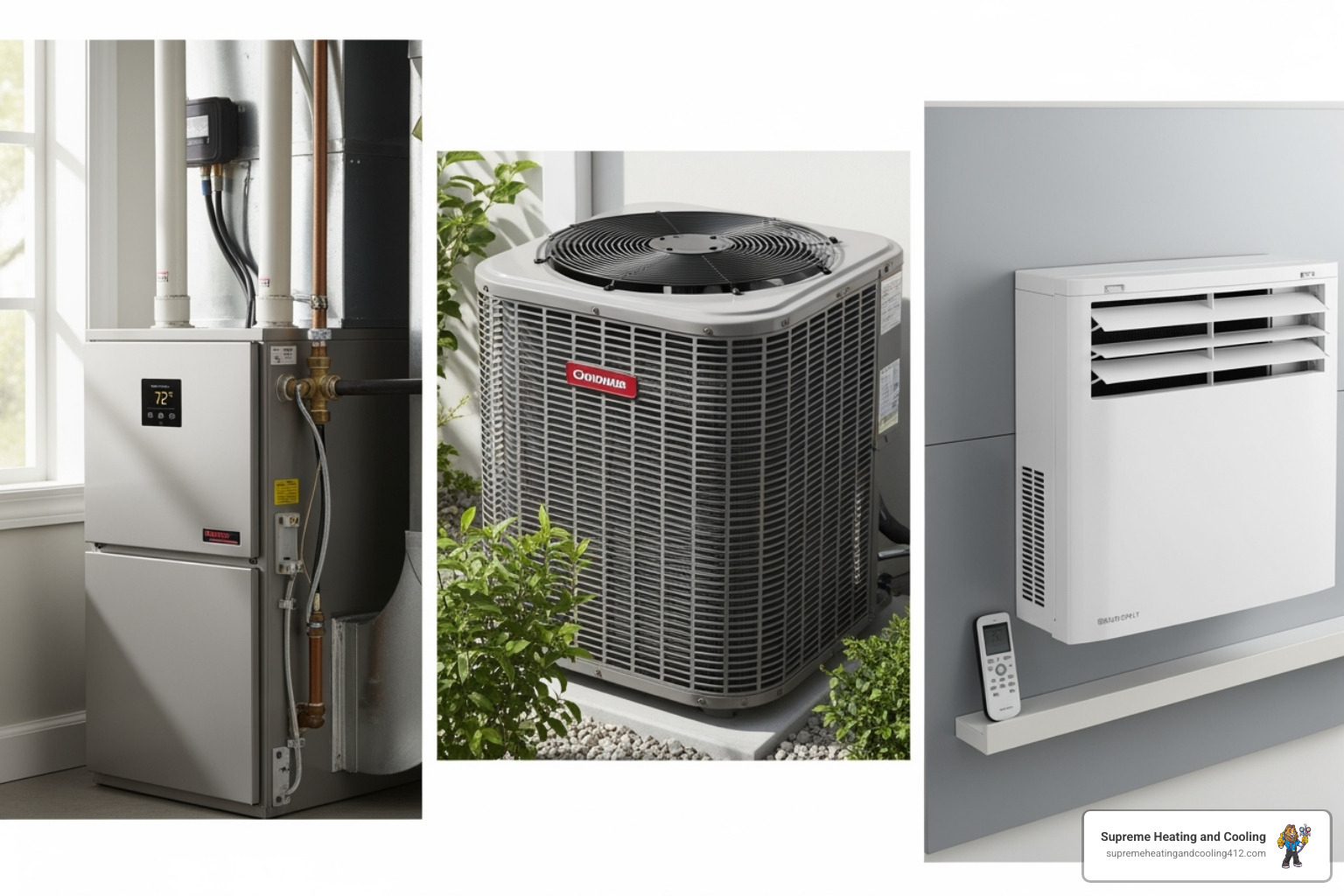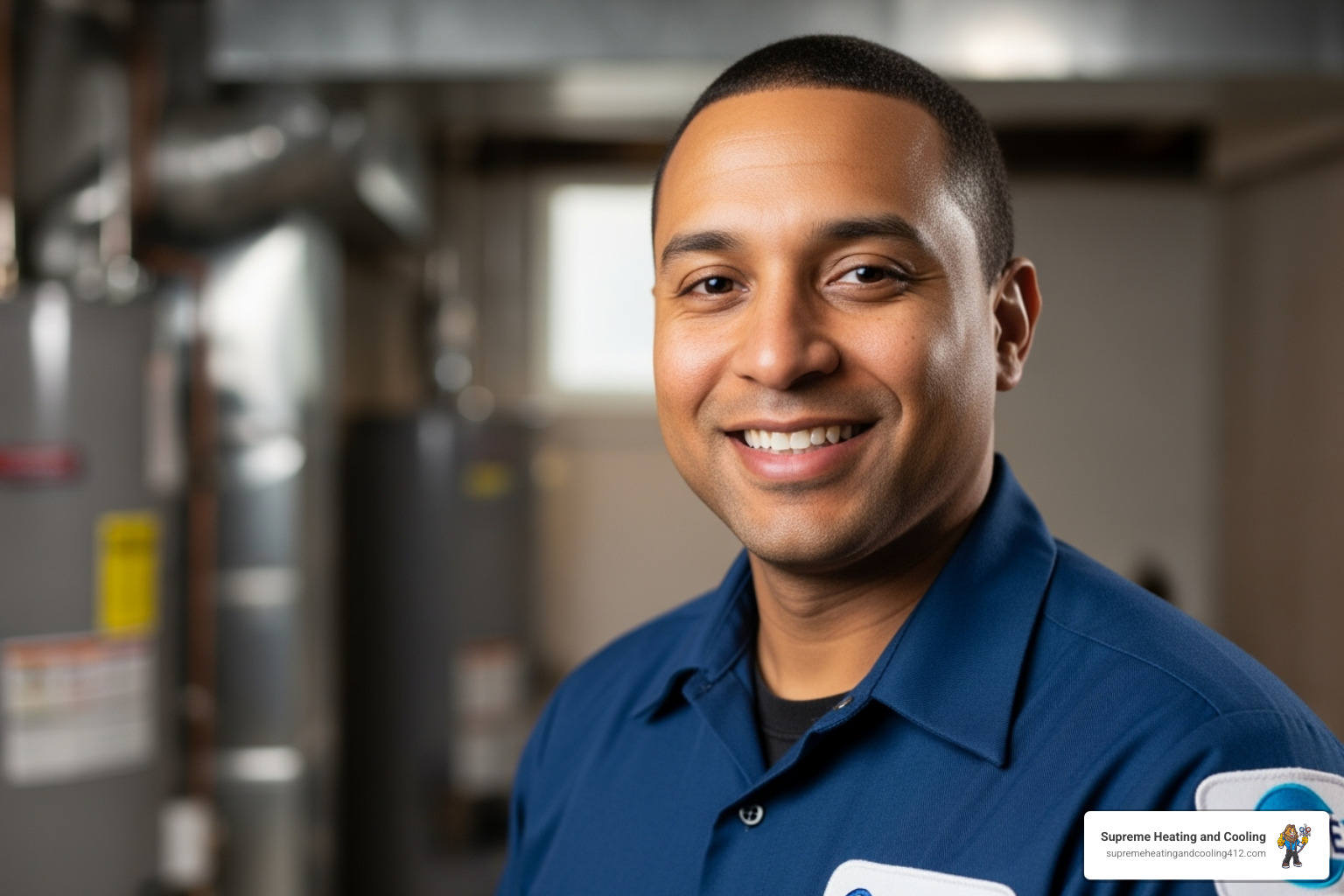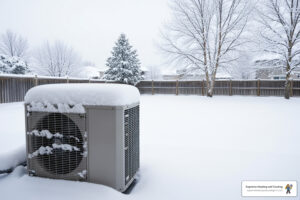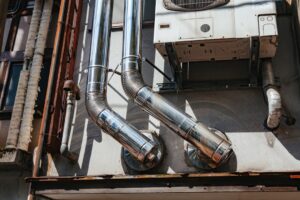Why Pittsburgh Homeowners Need Reliable HVAC Installation
HVAC installation Pittsburgh services are essential for year-round comfort in a city that experiences all four seasons. From chilly winters to humid summers, a reliable system is a must. Finding the right contractor to install it makes all the difference.
The key is choosing an installer who properly sizes your system, uses quality equipment, and stands behind their work. Look for companies with local experience, proper licensing, and transparent pricing. A professional installation ensures your system operates efficiently and lasts longer, saving you money on energy bills and future repairs.
Is It Time for a New HVAC System? 7 Telltale Signs
It’s a Pittsburgh homeowner’s nightmare: the furnace quits in the middle of winter, or the AC gives out on a sticky summer day. Most of these emergencies could be avoided by recognizing the warning signs early. Here are the seven telltale signs that your HVAC system is ready for retirement.
- Your system is getting old: If your system is 10-15 years old, it’s nearing the end of its expected lifespan. Even well-maintained systems lose efficiency and become less reliable with age.
- You need frequent repairs: Are you on a first-name basis with your repair technician? If repair bills are piling up, it’s often more cost-effective to replace the system than to continue patching it up.
- Your energy bills are climbing: A sudden spike in your utility bills without a change in usage means your system is working harder to maintain comfort. An efficient new system can significantly lower your monthly costs.
- Some rooms are too hot or too cold: Uneven temperatures throughout your home are a sign that your system is struggling to distribute air properly, possibly because it’s improperly sized or failing.
- You notice strange sounds and smells: Grinding, squealing, or banging noises are not normal. Neither are musty or burning odors. These are clear indicators of mechanical problems.
- Your indoor air quality is poor: An increase in dust, allergens, or humidity issues can mean your HVAC system is no longer filtering and circulating air effectively.
- Your AC uses R-22 refrigerant: This refrigerant (Freon) has been phased out. If your older system uses R-22 and develops a leak, a repair can be extremely expensive, making replacement the smarter financial choice.
Recognizing these signs can help you plan for a new HVAC installation Pittsburgh on your own terms. If you’re noticing several of these issues, it’s time for a professional assessment.
For more detailed guidance, check our resources on AC Repair vs. Replacement: Factors to Make the Right Decision and When to Consider Heating Replacement: Signs It’s Time for an Upgrade.
Choosing the Right System for Your Pittsburgh Home
Picking the perfect HVAC system for your Pittsburgh home is a big decision. When we perform a consultation, we assess key factors like your home size, layout, insulation quality, budget, and existing ductwork to guide our recommendation.
Main Types of HVAC Systems Available
Let’s review your options for HVAC installation Pittsburgh.
- Central Air Conditioners & Furnaces: This is the most popular combination for Pittsburgh homes. The furnace provides heat, the AC provides cooling, and both use the same ductwork to distribute air.
- Heat Pumps: These all-in-one systems heat and cool your home by transferring heat. In winter, they pull heat from the outside air into your home. In summer, they reverse the process. They are highly efficient, with common types being air-source and geothermal.
- Ductless Mini-Split Systems: Perfect for homes without ductwork or for zoning specific areas, these systems connect an outdoor unit to one or more indoor units for precise temperature control. Learn more about the Benefits of Ductless Mini Splits.
- Boilers: For homes with radiators or radiant floor heating, boilers heat water that circulates through pipes to provide comfortable, even warmth.
- Hybrid or Dual Fuel Systems: These systems combine an efficient electric heat pump with a powerful gas furnace, automatically switching to the furnace in extreme cold for optimal efficiency and performance.
For more on heating, see our guide: Bundled Up: Choosing the Right Heating System for Your Home.
Key Factors for Your HVAC Installation in Pittsburgh
- Proper System Sizing: This is critical. An undersized system won’t keep up, while an oversized one will waste energy and control humidity poorly. We perform a detailed Manual J load calculation, which analyzes your home’s specific characteristics to determine the exact size needed. Learn more about The Importance of Proper Sizing for AC Unit Replacement.
- Energy Efficiency Ratings: Look for high SEER (cooling), AFUE (furnace), and HSPF (heat pump heating) ratings. Higher numbers mean lower utility bills. ENERGY STAR certified products meet strict efficiency standards.
- Smart Thermostat Compatibility: Modern systems can be paired with smart thermostats for remote control, scheduling, and optimized energy use.
Improving Indoor Air Quality with Your New System
A new HVAC system is a great opportunity to improve your home’s air.
- Whole-House Humidifiers & Dehumidifiers: Humidifiers add moisture to combat dry winter air, while dehumidifiers remove excess moisture during humid summers, improving comfort and preventing mold.
- Advanced Air Filtration Systems: These capture microscopic particles like dust, pollen, and pet dander, which is ideal for family members with allergies. See our guide on Whole House Air Filtration Systems.
- UV Air Purifiers: Installed in your ductwork, these purifiers use UV light to kill airborne mold, bacteria, and viruses.
We can integrate these solutions into your new system for cleaner, healthier air. Learn more in our guide on Enhancing Indoor Air Quality.
Understanding HVAC Installation Pittsburgh Costs & Benefits
The cost of a new HVAC installation Pittsburgh is a major consideration, but the benefits extend far beyond basic heating and cooling.
A modern system increases your home’s value, offers quieter operation, and provides consistent comfort in every room. Plus, energy-efficient units help lower your carbon footprint.
What Influences the Cost of Installation?
Several factors determine the final price of your HVAC installation Pittsburgh:
- System Type and Brand: A high-efficiency heat pump will cost more than a standard furnace and AC combo.
- Unit Size: Capacity is measured in tons (cooling) and BTUs (heating). Larger homes need higher capacity units, but proper sizing is crucial—bigger isn’t always better.
- Efficiency Ratings: Units with higher SEER, AFUE, or HSPF ratings cost more upfront but deliver long-term savings on utility bills.
- Ductwork and Labor: The complexity of the job, including any necessary ductwork repairs or modifications, will affect the labor costs.
Check our Specials for current offers and read our guide on Deciphering AC Installation Costs: A Guide to Effective Budgeting for more details.
The Long-Term Benefits of a Professional Installation
A professional installation is an investment that pays for itself over time.
- Improved Energy Efficiency: A properly installed and calibrated system runs exactly as the manufacturer intended, minimizing energy waste.
- Lower Utility Bills: This efficiency translates directly into lower monthly energy costs, with some homeowners saving 30% or more.
- Improved Home Comfort: Professional installation ensures proper airflow and temperature control, eliminating hot and cold spots.
- Better Reliability: A quality installation means fewer breakdowns and a longer lifespan for your equipment, saving you from unexpected repair costs.
Learn more about the long-term value in our article Investing in Comfort: How Furnace Replacement Adds Value to Your Home.
How to Find a Reputable HVAC Contractor
Choosing the right contractor for your HVAC installation Pittsburgh is crucial for ensuring years of reliable comfort. Here’s what to look for to find a trustworthy professional.
First, check for proper licensing and insurance. This protects you in case anything goes wrong. Next, verify local experience. A contractor familiar with Pittsburgh’s climate and building codes is invaluable. Read customer reviews to get insight into a company’s professionalism and service quality. Finally, always get detailed, written estimates that break down all costs.
What to Look for in a Pittsburgh HVAC Company
When evaluating contractors, look for these qualities:
- Years in Business & Local Reputation: A long history and positive community standing indicate stability and quality service.
- Transparent Pricing: Reputable companies provide clear, upfront pricing without hidden fees.
- Strong Warranties: Look for contractors who warranty their installation labor in addition to the manufacturer’s equipment warranty.
- Customer-Centric Approach: The right partner will listen to your needs, answer questions patiently, and prioritize your satisfaction.
For more guidance, see our guide on Choosing the Right HVAC Professional for Your Heating Installation and learn about our philosophy in Our HVAC Company Ensures Peace.
The Importance of NATE Certification
NATE (North American Technician Excellence) certification is the industry’s gold standard. It signifies that a technician has proven technical expertise through rigorous, real-world testing. For homeowners, choosing a NATE-certified technician provides peace of mind, knowing your installer understands industry best practices for quality, professionalism, and safety. Learn more at NATE certification is important.
Protecting Your Investment with a Maintenance Plan
After your HVAC installation Pittsburgh, a maintenance plan is the best way to protect your investment.
- Preventative Care: Regular tune-ups catch small issues before they become expensive emergencies.
- Extended Equipment Lifespan: Well-maintained systems last longer, delaying costly replacement.
- Priority Service & Discounts: Members often receive priority scheduling and discounts on repairs.
Regular maintenance ensures your system runs efficiently and reliably. Learn more in our article on The Importance of Air Conditioner Maintenance: What You Need to Know.
What to Expect During the HVAC Installation Process
We aim to make your HVAC installation Pittsburgh project as smooth and stress-free as possible by keeping you informed every step of the way.
On installation day, we ask that you clear a path to the work areas. Our team will use drop cloths and shoe covers to protect your property. Most standard replacements take about a day, though we’ll provide a clear installation timeline upfront. After the work is done, we perform a thorough cleanup and remove all old equipment. The process concludes with a final walkthrough, where our lead technician will show you how to operate your new system and answer any questions.
A Step-by-Step Guide to Installation Day
Here’s what happens during a typical installation:
- Removing the Old Unit: We safely disconnect and remove your old equipment, properly handling any refrigerant according to EPA regulations.
- Setting the New Equipment: We carefully position the new indoor and outdoor units for optimal performance and efficiency.
- Making Connections: Our technicians expertly connect all ductwork, electrical wiring, and refrigerant lines, ensuring airtight seals and safe, code-compliant work.
- System Testing and Calibration: We thoroughly test every aspect of the new system—airflow, temperature, refrigerant levels—and calibrate it to run at peak performance from day one.
For tips on getting ready, see our AC Installation Checklist: Tips to Prepare Your Home. To understand what makes a great installation, read our guide on Quality Assurance: How to Evaluate a Successful Furnace Installation.
How Long Does a Typical HVAC Installation in Pittsburgh Take?
A standard replacement of a furnace and AC unit usually takes one full day.
Complex installations, such as those requiring new ductwork or involving specialized systems like geothermal, may take two or more days. Factors like the accessibility of the work area can also affect the timeline. We will always provide a realistic estimate during your consultation and communicate clearly if any unexpected issues arise. Our priority is doing the job right, not rushing through it. Learn more in our article Why Professional Air Conditioner Installation Matters.
Frequently Asked Questions about HVAC Installation
We’ve helped countless Pittsburgh families with their HVAC installation Pittsburgh and have answered just about every question imaginable. Here are some of the most common ones.
How often should I service my new HVAC system?
We recommend servicing your system twice a year: a heating tune-up in the fall and a cooling tune-up in the spring. This is the best way to ensure reliability and efficiency for Pittsburgh’s demanding seasons. Annual maintenance is key to protecting your investment, keeping your warranty valid, and catching small problems before they become expensive repairs. For more details, read The Importance of Regular Heating Maintenance Services.
What’s the difference between residential and commercial HVAC needs?
While both provide comfort, they differ significantly. Commercial systems are much larger and more complex to handle bigger spaces and higher occupancy. They also have stricter code requirements for ventilation and safety. Residential systems, on the other hand, are specifically designed and sized for a single family’s comfort and efficiency needs, which is our primary focus.
What financing options are typically available for a new HVAC system?
A new HVAC system is a significant investment, but several options can make it more manageable.
- Financing Plans: We work with financial partners to offer flexible payment plans.
- Rebates and Credits: You may be eligible for manufacturer rebates, local utility credits, and federal tax incentives for installing high-efficiency models. These can add up to significant savings.
We can discuss all available options during your consultation. Also, be sure to check our Specials page for current promotions that can make your new system even more affordable.
Conclusion: Your Partner for Year-Round Comfort in Pittsburgh
Choosing a new HVAC installation Pittsburgh is an investment in your home’s comfort and value. A professional installation delivers improved energy efficiency, lower utility bills, consistent comfort, and better reliability. The long-term value of a properly installed system provides peace of mind, knowing your family will be comfortable no matter what Pittsburgh’s weather brings.
At Supreme Heating and Cooling, we understand that this decision is about more than just equipment—it’s about trust. Our experienced team is committed to providing honest advice, transparent pricing, and friendly, no-pressure service. We treat your home with the care we’d show our own.
Whether your furnace is struggling through another winter or your AC can’t handle the summer humidity, we’re here to help you find the perfect solution.
For a friendly, no-pressure consultation on your home’s comfort needs, explore our expert furnace installation services in the Pittsburgh area. Let us show you how the right HVAC system can transform your home’s comfort.

